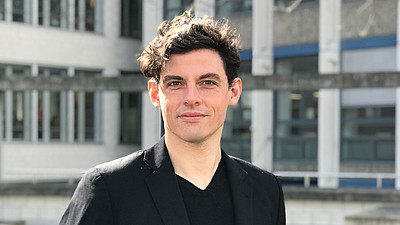Prof. Dr. Andreas Braun
It must be possible for us to keep the planet in a state that maintains a good basis for life for everyone in the long term and protects ecosystems.
Interview
Human Environment Interactions: What exactly are you researching in your field?
We investigate how and on the basis of which mechanisms people interact with their environment - perceive, use, protect and burden it - and how this affects human societies. In other words, how societies and environments are mutually dependent. A particular focus is on land use and climate change, the use of resources and their connection to human health.
What inspired you to work scientifically in this field?
I first studied geoecology, a subject that is itself situated at the so-called human-environment interface. As part of my PhD on the effects of the forestry industry in Chile in 2010, I sat in a tree plantation that had been deforested over 50 hectares. Looking at this massive environmental destruction, I realized that I wouldn't be able to make any progress here without social science skills. So I studied sociology during my doctorate and delved deeper and deeper into the mechanisms of human land use and their consequences for human-environment systems.
What specific questions or problems are you currently trying to solve?
When I accepted the position, I decided to combine my previous research more closely with health-related issues. Out of curiosity and pure interest in new fields of activity. I have also set up my team in this disciplinary way. We are currently working intensively on how our existing human-environment research can be combined with the OneHealth concept.
What is currently your most important research project and why?
I'm still new at the University of Kassel and have yet to acquire third-party funding. Several very promising doctoral projects are currently underway. Personally, my most important project at the moment is the Kassel Institute itself. Of course, I am actively working with my team to acquire third-party funded projects, but above all, the Kassel Institute now needs patient and efficient architects who are tirelessly committed to building cooperation structures, finding topics, teaching collaborations, etc.
What challenges do you face with your research?
A major and lasting challenge is the transformation of science itself. What does it take for it to make an optimal contribution to sustainability? What role do interdisciplinarity and transdisciplinarity play and how do models of knowledge need to be adapted and changed? I am also working on epistemology with my interdisciplinary group, doctoral students and colleagues.
Which methods do you mainly use in your research?
We rely on inter- and transdisciplinary diversity of methods and approaches. In particular, we use methods from landscape ecology, environmental social science, epidemiology and the environmental justice discourse.
What moments do you particularly enjoy in your scientific work?
What I particularly enjoy is the contact with young people, i.e. students, doctoral candidates and postdocs. The advantage of being a professor is that you get older and older yourself, but the generations of students remain just as young. They contribute a lot of motivation, ideas, criticism and perspectives. A lot can be learned from this, and it's especially my own learning, understanding new things, that motivates me a lot.
What personal goals or visions drive you in your scientific work?
I want to make the world a better place! I want to solve problems and do things that are really important. I'm particularly concerned about climate change at the moment. I ask myself: "It must be possible for us to keep the planet in a state that preserves good living conditions for everyone in the long term and protects the ecosystems". This is exactly what I want to contribute to.
What characterizes sustainability research at the Kassel Institute for Sustainability?
The Kassel Institute inspires me. At the Kassel Institute, we are interested in both material needs (socio-ecological interactions, socio-technical systems, resilient spaces and global welfare practices) and normative dimensions (democracy, justice and reflexivity). This gives us an innovative, different approach to thinking about sustainability.
The Kassel Institute for Sustainability pursues an interdisciplinary approach. Where do you see the interfaces to the other research projects?
The disciplinary diversity, but also the commonalities (for example interest in Global South research and critical research) in Kassel are fascinating. Through my work as a core professor, I am constantly talking to colleagues about their research. There are great links to agricultural and environmental science research, but also to social science research, e.g. in the field of gender.
